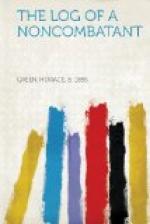“Day by day here the hatred grows of England and things English: judging from the press and the temper of the people, one would think that England is the only foe. As a nation and as individuals they bear no particular malice toward France. They even feel sorry for ‘misguided’ Belgium—betrayed by the British, they say. But England they look upon as the root of all their trouble, the despicable, retreating enemy they cannot touch, the enemy, they maintain, whose clever, but selfish, diplomacy has forced the brunt of the fighting on the others, while she sits back to wait for the spoils.”
On my arrival in Berlin I delivered the mail packet to Ambassador Gerard. Two days later I presented my credentials at the Auswartige Amt, or Foreign Office, hoping to get permission to go to the western front with the Crown Prince’s army. I was told to see Baron von Mumm Schwartzenstein, who was officially designated by Von Jagow to handle neutral correspondents, and who, unofficially, I have reason to believe, is connected with the Secret Service. He is a pudgy sort of man, with a watery skin, and decidedly not of military build or bearing. When, after much red tape, I was finally admitted to an outer office, he stepped out to see me, merely taking my name and the names of the papers I represented. I was told to come back in the evening. When I did so and was admitted to His Holy of Holies, he said to me at once:—
“I was expecting you to come yesterday. Why did you not?”
This was rather startling, but his next remark altogether took away my breath.
“Were you satisfied with your treatment by the War Office in Brussels, Herr Green? And why, if you have already been wiss ze army in scenes of war, do you now come to me for permission?”
Mind you, I had at this time spoken scarcely a word, and had certainly told nothing of my age or previous condition of servitude in Brussels. But the Government that never forgets knew all about my movements. He smiled at my discomfiture, and, within the next few minutes, proved to be such a genial German (for war-time) that I soon told him all about my adventures, including the fact that I had gone back into Antwerp and entered Belgian lines, after escaping from German surveillance at Aix. I happened to speak of the marvelous efficiency and preparedness of the German army in Belgium.
“Yes, that iss quite so,” remarked His Excellency, with a smile. “You see, we were prepared for everysing—except,” he added after a pause,—“except ze invasion of ze American newspaperman. When he iss out of our sight, zen we do not feel secure.”
Several weeks later, after I had come out of the Kaiser’s realm, a representative of the “Boston Journal,” who had been looking for me all over the Continent, ran me down just as I was leaving The Hague for England.
“The Foreign Office in Berlin told me where to find you,” he said. “They told me that in Berlin you had stayed first at the Esplanade, and then you had moved to the Kaiserhof. They said you had left the city [this was when I went out toward Poland], that you had returned to Berlin, and that on such and such a date at 8.45 you had departed for The Hague."!!




